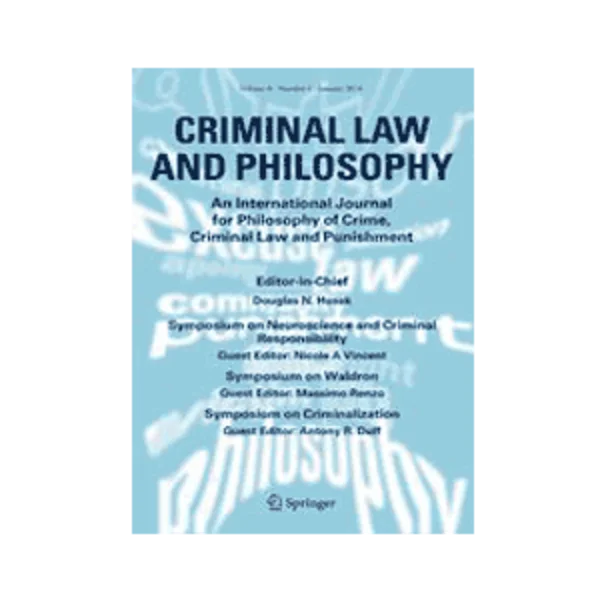-
in defense of “pure” legal moralism
جزئیات بیشتر مقاله- تاریخ ارائه: 1392/07/24
- تاریخ انتشار در تی پی بین: 1392/07/24
- تعداد بازدید: 944
- تعداد پرسش و پاسخ ها: 0
- شماره تماس دبیرخانه رویداد: -
in this paper i argue that joel feinberg was wrong to suppose that liberals must oppose any criminalization of “harmless immorality”. the problem with a theory that permits criminalization only on the basis of his harm and offense principles is that it is underinclusive, ruling out laws that most liberals believe are justified. one objection (arthur ripstein’s) is that feinberg’s theory is unable to account for the criminalization of harmless personal grievances. another (larry alexander’s and robert george’s) is that it cannot account for public decency laws. i shall reject both of these underinclusiveness objections in favor of one that focuses on the “free floating evil” of corpse desecration. liberals need “pure” legal moralism (plm) to explain their support for a criminal ban on mistreatment of the dead. i also argue that while deterrence is plausibly regarded as the primary rationale for criminalizing and punishing wrongs like murder or rape, it is not plausibly regarded as any part of the rationale for criminalizing free floating evils. the point of punishing corpse desecrators has to be either retribution or the promotion of virtue/discouraging of vice. finally, i consider feinberg’s reason for rejecting all plm, namely, that competent adults have a right to personal sovereignty or autonomy, and the state’s duty to respect that right trumps the desirability of punishing or reducing the vice associated with harmless immorality. i argue that feinberg’s argument here fails because it exaggerates the right’s strength and scope.
مقالات جدیدترین رویدادها
-
استفاده از تحلیل اهمیت-عملکرد در ارائه الگوی مدیریت خلاقیت سازمانی و ارائه راهکار جهت بهبود
-
بررسی تاثیر ارزش وجوه نقد مازاد بر ساختار سرمایه شرکت های پذیرفته شده در بورس اوراق بهادار تهران
-
بررسی تأثیر سطح افشای ریسک بر قرارداد بدهی شرکت های پذیرفته شده در بورس اوراق بهادار تهران
-
بررسی تأثیر رتبه بندی اعتباری مبتنی بر مدل امتیاز بازار نوظهور بر نقد شوندگی سهام با تأکید بر خصوصی سازی شرکت ها
-
تأثیر آمیخته بازاریابی پوشاک ایرانی بر تصویر ذهنی مشتری پوشاک ایرانی (هاکوپیان)
-
سنتز نانو ذرات دی اکسید قلع و بررسی اثر ماندگاری سل بر خواص اپتیکی نانوذرات
-
تحلیل شهر دوست دار کودک با استفاده از مدل swot (نمونه موردی: منطقه 13 تهران)
-
بررسی تاثیر سرعت افزایش دما برکاهش گوگرد از کک نفتی، با استفاده از روش تاخیری
-
بررسی رابطه سبد درآمدی بانک با مدیریت سود در بانک های خصوصی
-
the effect of functionalized group concentration on the stability and thermal conductivity of carbon nanotube fluid as heat transfer media
مقالات جدیدترین ژورنال ها
-
مدیریت و بررسی افسردگی دانش آموزان دختر مقطع متوسطه دوم در دروان کرونا در شهرستان دزفول
-
مدیریت و بررسی خرد سیاسی در اندیشه ی فردوسی در ادب ایران
-
واکاوی و مدیریت توصیفی قلمدان(جاکلیدی)ضریح در موزه آستان قدس رضوی
-
بررسی تاثیر خلاقیت، دانش و انگیزه کارکنان بر پیشنهادات نوآورانه کارکنان ( مورد مطالعه: هتل های 3 و 4 ستاره استان کرمان)
-
بررسی تاثیر کیفیت سیستم های اطلاعاتی بر تصمیم گیری موفق در شرکتهای تولیدی استان اصفهان (مورد مطالعه: مدیران شرکتهای تولیدی استان اصفهان)
-
هاردشیپ در کنوانسیون بیع بین المللی کالا-بررسی تطبیقی تفاسیر جدید
-
تبارشناسی شکیبایی سیاسی از منظر حقوق بشر معاصر
-
بررسی شیوع خشونت خانواده و عوامل شهرنشینی موثر بر آن در دوران کرونا
-
بررسی تأثیر ابعاد شخصیتی برند و دانش برند بر ارزش ویژه برند با در نظر گرفتن تبلیغات کلامی
-
بررسی انتقادی تفسیر مشهور از آیه «لا اِکراهَ فِی الدِّینِ»




سوال خود را در مورد این مقاله مطرح نمایید :